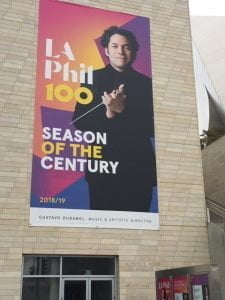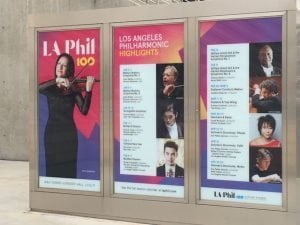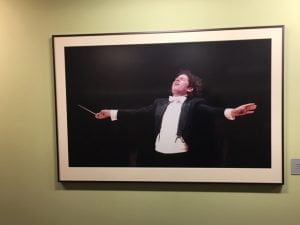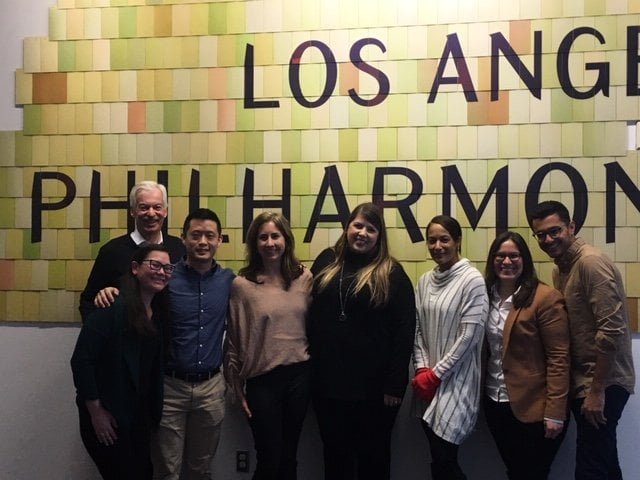Better Than Most is a regular feature of The Business of Giving, examining the best places to work among social good businesses and nonprofit organizations.
Denver: And for this edition of Better Than Most, we will be going to South Grand Avenue in Los Angeles and to the home of the LA Philharmonic who by the way is celebrating their centennial anniversary this year. We’ll start with their President, Simon Woods, and then hear from some of the other members of the team.
Simon: If you believe you start from that starting point that culture is important to strategy, then that has to reflect in your behavior as a leader which means that when you walk in the door every morning, you have to realize that half your job may be about leading strategy but another half of your job may be leading culture. If you believe that, which I do, then it gives you a very different set of answers about what is your daily work, about what are your priorities within the organization and most importantly, how do you lead from culture – you have to lead from values.
 Sam: Actually, Simon had come into us at HR and said, “You know, I really want to learn about our employees. I want to see what their experience is like,” so within the first 30 days of employment, we’re having new hires meet with Simon for about 30 minutes in a group setting just to have lunch in a casual setting. Find out what brought them here, what their background is, what challenges they’re having, what successes that they’re finding, what has surprised them? The employees are really finding that to be just a true marker of how invested from the top-down, our association is in their success in wanting to know more about what they want from the LA Phil.
Sam: Actually, Simon had come into us at HR and said, “You know, I really want to learn about our employees. I want to see what their experience is like,” so within the first 30 days of employment, we’re having new hires meet with Simon for about 30 minutes in a group setting just to have lunch in a casual setting. Find out what brought them here, what their background is, what challenges they’re having, what successes that they’re finding, what has surprised them? The employees are really finding that to be just a true marker of how invested from the top-down, our association is in their success in wanting to know more about what they want from the LA Phil.
Michael: I think that there’s a culture in the company of getting it done, and that’s the closest thing that you can say is a guiding principle. So, the collaboration comes out of a joint effort to achieving something whatever that might be. Our artistic planning or presentations team comes up with a piece of programming that is unique and has never been done before and maybe is incredibly high profile or is maybe incredibly intimate. But each of those things, each of those programs presents a new kind of challenge, and those unique challenges are what push you to have to collaborate either interdepartmentally or with other organizations from outside of the LA Phil or with the city or working internationally or whatever it might be in order to accomplish that thing and put that on stage.
Lisa: We’re not afraid to take on new things. We’re not afraid to fail. We don’t fail often but we are willing to put ourselves out there and try different things. We trust our audience to take that journey with us. I really admire that about us. I think it’s Los Angeles. I think people here are open to trying new things and embracing new things, and we’re right along there with them.
Nora: I would say that the foundation of collaboration here at the LA Phil is based in passion – passion about what we present and what we produce; and respect – respect of each other and our coworkers. I hear all the time when people are describing the work that they do here and their colleagues as being the best in the business, we really feel that regardless of who you’re working with or who you’re collaborating with, they are really exceptional at what they do. That really supports a desire to collaborate because you want the product of your project, whatever it is, to be the best it possibly can be.
 Lisa: I feel that everyone here does feed off of everyone’s collective energy. We push; and not in a bad way, we push each other to be the best and to do better and to not rest on our laurels because there’s always more that can be done. I’m always really proud to tell people where I work, and there’s always this look of admiration when I say that. So, that is something I get from the organization, and I really appreciate that.
Lisa: I feel that everyone here does feed off of everyone’s collective energy. We push; and not in a bad way, we push each other to be the best and to do better and to not rest on our laurels because there’s always more that can be done. I’m always really proud to tell people where I work, and there’s always this look of admiration when I say that. So, that is something I get from the organization, and I really appreciate that.
Julia: Board members are able to be very well informed about our financial and other picture, and they can then guide us in a really strategic way through the high quality information that they are provided from our finance and development teams. I think board members really love… they come for the artistic quality, and they come because they love the orchestra, and they always seem to be very impressed by how well ran an organization we are; how fiscally balanced, how strong we are, and I think that’s why… one reason that we’ve been able to keep such a great board engaged for so long is that financial strength.
Dustin: My favorite thing about work is the actual work itself. About 10 years ago, I got my degree in music. I was actually in clarinet performance. Shortly after that, I got my degree in accounting. Up until this point, I’ve never been able to work for an arts organization, and it’s always been a goal of mine to bridge the two disciplines together. To be able to do that, an organization like this has been really helpful for me. I see… I get to now see financial data that’s relevant to me and that I care about. For example, I get to see commission payments that we make to composers who are writing new works. I feel now that I’m more connected to the music world than I ever have been before.
Angelica: I’m also on the Centennial Leaders class here which is a new program here at Phil where 10 of us are selected to be part of the leadership program. We have access to board members. We have meetings with the executive team. It is really a program that is aiming to develop the staff here within the Phil and I think the secret sauce is that it exists at all levels. Again, we’ve heard board members talk about their failures. We have heard our executive staff talk about their failures in presenting to board members. I think that willingness to be transparent with each other and willingness to be transparent with anyone who asks questions – that allows the rest of the staff to feel really supported in terms of failing. It is absolutely okay if you fail but it’s going to get better next time.
Michael: We all come from some semblance of theatrical background and made our way into classical music and there is a sensibility when you are working on a short term show with a cast that you band closely together; you’re in it together; you’re working as a team to get this thing done, and then you disperse. And because you know that you’re only together for a short period of time, you bond really tightly and then you maintain those relationships.
 Sam: We have peer nominations where employees are encouraged to submit this feedback that goes directly to Simon and is also reviewed by our HR team, and then at any of our staff meeting that we have, we play all of these nominations on a loop before any of the meetings, so that way, everyone can see what successes and what amazing work everyone is doing that you might not normally know about.
Sam: We have peer nominations where employees are encouraged to submit this feedback that goes directly to Simon and is also reviewed by our HR team, and then at any of our staff meeting that we have, we play all of these nominations on a loop before any of the meetings, so that way, everyone can see what successes and what amazing work everyone is doing that you might not normally know about.
Simon: So, the thing you have to think a lot about is how you build structures which work against the sense of hierarchy. Forming groups for example, which is a couple of things we’ve done here in the last year… forming a kind of mid-level groups of mid-level management to really think through specific issues. In our case, one is about communication and integration. Another in our case is about diversity and equity, and to say to those groups, we want you to think organically from the middle of the staff, recognizing that there’s tremendous wisdom in every single person who works in this organization, and if you can build that brain trust of people at every level in the organization, not just treat everything as a hierarchical decision to be pushed up to the top of the chain and pushed down again, and you begin to build a culture where people really feel like they have a voice.

Denver: I would like to thank Sophie Jefferies for organizing my visit and for all those who participated in this piece Julia Cole, Michael Vitale, Samantha Ganeku, Nora Brady, Lisa White, Angelica Cortez, Dustin Hsu, and Simon Woods. To hear this again, read the transcript or see pictures of the participants and the offices of Philharmonic, simply come visit denver-frederick.com.
The Business of Giving can be heard every Sunday evening between 6:00 p.m. and 7:00 p.m. Eastern on AM 970 The Answer in New York and on iHeartRadio. You can follow us @bizofgive on Twitter, @bizofgive on Instagram and at http://www.facebook.com/BusinessOfGiving

